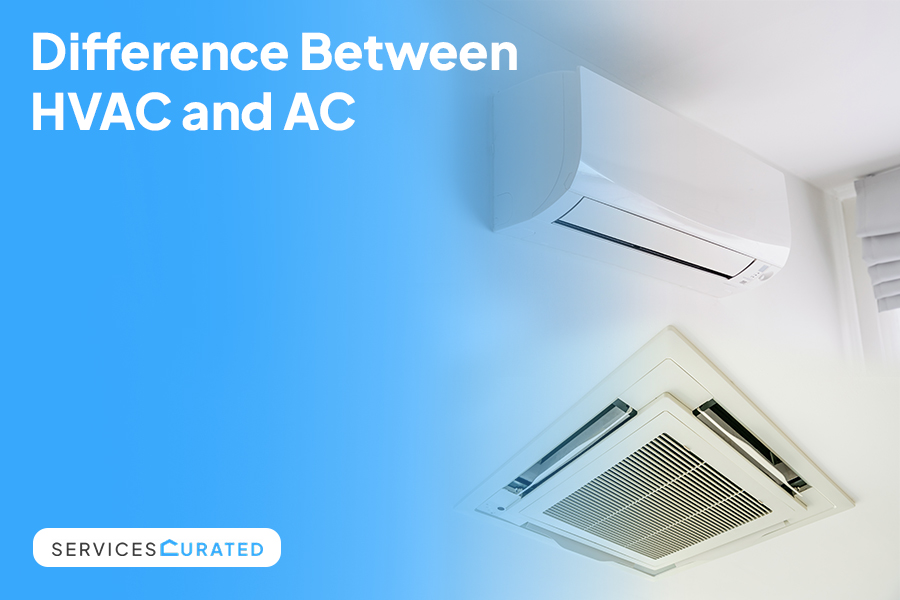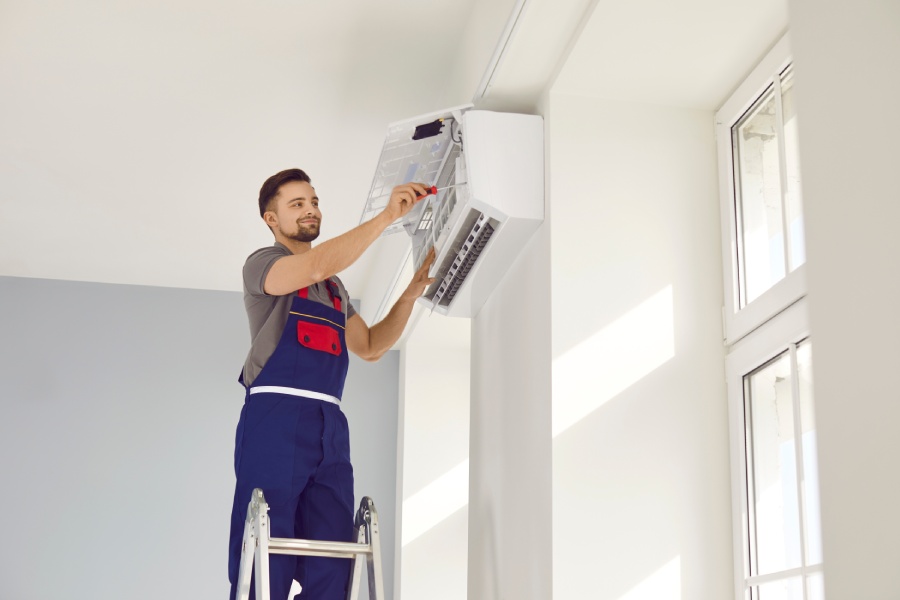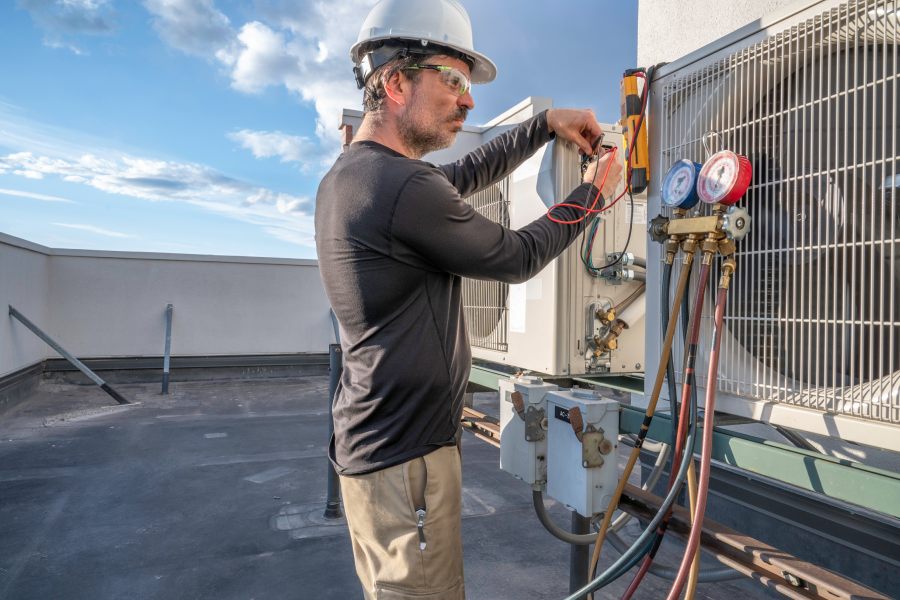Difference Between HVAC and AC

In the world of indoor climate control, two terms frequently arise: HVAC and AC. While often used interchangeably, these acronyms represent different aspects of keeping our living and working spaces comfortable. So, understanding the difference between HVAC and AC is crucial for homeowners and businesses.
In this article, we will explore the key differences between HVAC systems and air conditioners. We’ll delve into how HVAC systems offer a comprehensive approach to managing indoor climate through heating, cooling, ventilation, and air quality control.
Join us as we uncover the key distinction between these important climate control technologies!

Difference Between HVAC and AC
HVAC, which stands for Heating, Ventilation, and Air Conditioning, is a comprehensive system designed to manage heating, cooling, and air quality throughout the year. It offers complete climate control by integrating all these functions into one system. In contrast, AC, or Air Conditioning, focuses exclusively on cooling and moisture removal during hot weather.
While HVAC systems are more complex and costly to install, they provide a full range of climate control. AC systems, on the other hand, are simpler and less expensive but only offer cooling capabilities. Choosing between an HVAC system and a standalone AC unit depends on your climate needs and comfort preferences.
Comparing HVAC vs AC Units
Scope and function
HVAC systems
HVAC systems are essential for keeping your home comfortable throughout the year. They achieve this by regulating temperature and air quality: furnaces, heat pumps, and boilers handle heating, while air conditioners equipped with refrigerants control cooling.
There are various types of HVAC systems, including split systems, hybrid systems, duct-free systems, and packaged systems, each offering different setups to meet unique needs.
Ventilation is managed through a network of ducts and fans that work in tandem to ensure proper air circulation. A central control system coordinates all these components, seamlessly integrating heating, cooling, and ventilation to maintain an optimal indoor climate and maximize energy efficiency.
AC systems
Air conditioning systems are designed primarily to cool your home by removing heat and humidity with a specialized cooling liquid. There are several types of air conditioning systems, including central air conditioners, ductless mini-splits, window units, and portable air conditioners, each suited to different spaces and cooling needs. Unlike HVAC systems, which provide heating, ventilation, and cooling, AC units focus exclusively on lowering temperatures.
In warm climates, air conditioners can function independently. However, they are often integrated into a comprehensive HVAC system, which offers complete climate control and ensures your home stays comfortable throughout the year.
Energy sources and efficiency
HVAC systems
HVAC systems can be powered by natural gas, electricity, or a combination of both, with hybrid systems designed to switch between these sources to maximize efficiency and minimize costs. The choice of energy source significantly influences the system’s efficiency and operating expenses, which can vary based on local climate and energy prices.
Efficiency is quantified through the Annual Fuel Utilization Efficiency (AFUE) rating for heating and the Seasonal Energy Efficiency Ratio (SEER) for cooling. Higher ratings indicate better efficiency. To achieve the best performance and extend the life of an HVAC system, it’s crucial to ensure regular maintenance and proper system sizing.
AC systems
Most air conditioning systems use electricity from the power grid, although some homes utilize solar panels. Gas-powered air conditioning units are less common in residential settings and are typically found in larger buildings.
Like HVAC systems, the efficiency of air conditioning units is evaluated using the SEER rating. Higher numbers signify units that are more efficient, cost-effective, and environmentally friendly.
Installation and cost
HVAC systems
Installing an HVAC system is a complex process that demands expert knowledge, particularly when setting up ductwork and units and integrating electrical and plumbing work. Unlike a standalone AC unit, an HVAC system offers comprehensive heating, cooling, and ventilation solutions.
Although the initial installation costs are higher, the system can significantly save over time due to its increased efficiency and reduced energy bills. Additionally, HVAC systems provide superior control over indoor air quality, which is essential for maintaining health and comfort in residential and commercial environments.
AC systems
Installing an AC system is straightforward and efficient. It involves only a cooling unit with outdoor and indoor components. Choosing the right size is crucial for optimal cooling performance. While AC units are generally less expensive to install initially, they are designed solely for cooling.
In contrast, HVAC systems offer the added benefits of heating and air quality management. In colder climates, a separate heating system might be required, which could increase the overall cost.
Maintenance requirements
HVAC systems
Regular maintenance is crucial for HVAC systems. This includes changing filters, cleaning coils, and checking refrigerant levels. Annual professional inspections are also important, as they help identify and address minor issues before they become major problems.
Keeping up with these tasks ensures your system runs efficiently, extends its lifespan, and maintains a comfortable home environment throughout the year. Plus, proactive maintenance can prevent costly repairs in the future.

AC systems
Proper maintenance of an AC system is essential for its efficiency and longevity. This routine includes cleaning the condenser coils, checking refrigerant levels, and replacing filters.
In colder climates, consider covering the AC unit during winter to protect it from debris, ice, and snow, which can cause damage and impact performance.
Performing these tasks annually, preferably before the hot weather arrives, helps prevent unexpected breakdowns and reduces energy costs. In particularly hot climates, scheduling bi-annual checks can further enhance cooling performance and minimize the need for emergency repairs.
Moreover, regular maintenance contributes to better indoor air quality by preventing mold and bacteria buildup within the system. By doing this, you not only extend the lifespan of your AC unit but also ensure a healthier and more comfortable indoor environment.
Conclusion
HVAC and AC systems serve distinct but complementary roles in indoor climate control. HVAC systems offer a comprehensive approach by integrating heating, cooling, and ventilation, making them ideal for year-round comfort and energy efficiency. In contrast, air conditioners focus solely on cooling and moisture removal, making them a simpler and often more cost-effective choice for hot climates.
Additionally, while HVAC systems are more complex and have higher initial costs, they provide extensive climate management and improved air quality. On the other hand, AC units are easier to install and maintain but lack the versatility of HVAC systems.
So, understanding the difference between HVAC and AC can help you make informed decisions about your climate control needs and investments.
